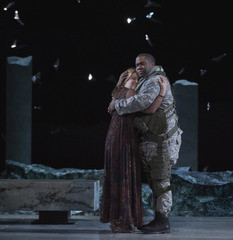|
Back
A stirring achievement Toronto
The Four Seasons Centre for the Performing Arts
04/05/2014 - & April 11, 15, 19, 24, 27, 30, 2014
George Frideric Handel: Hercules
Alice Coote (Dejanira), Eric Owens (Hercules), Lucy Crowe (Iole), Richard Croft (Hyllus), David Daniels (Lychus)
The Canadian Opera Company Chorus, Sandra Horst (chorus master), The Canadian Opera Company Orchestra, Harry Bicket (conductor)
Peter Sellars (director), George Tsypin (set designer), Dunya Ramicova (costume designer), James F. Ingalls (lighting designer)

A. Coote & E. Owens (© Michael Cooper)
The central fact of this production (shared with Chicago Lyric Opera where it was performed with the same stellar cast in 2011) is that producer Peter Sellars and the amazingly dedicated singers have assiduously brought forth every ounce, gram and molecule of emotion from every note performed.
Sellars has tightened the work up to some extent to good effect, and a couple of arias have adroitly been moved forward in the action. Even though all the principles except for Hercules have had an aria cut (and even the chorus has lost a number) it still comes across as a slow-moving drama with no less than 20 da capo arias, each of which has an emotional focus (typically plaintive, anxious, grief-stricken, rancorous) - and each of which is also shot through with conflicting emotions, most of them painful.
The plot tells of Hercules returning from war with a captive princess, Iole. His son, Hyllus, sympathizes with her plight and falls in love. Hercules’ wife, Dejanira, was anxious for his return but is angry at the presence of Iole. A herald, Lichus, makes attempts at reconciliation. Dejanira gives Hercules a cloak, thinking it has power to rekindle his love for her; instead, (there is a back story to one of Hercules’s earlier exploits) it brings about his agonizing death.
Each of the five principals seems born to play his or her role. The opera could well have been title Dejanira, so large and various is this central role. Alice Coote plays a woman at the end of her tether, starting out plaintive but becoming angry, indignant, mocking. Her aria “Resign thy club”, with its rocking beat, simply has to be the strangest number Handel composed. She sings it immediately following Hercules “Alcides’s name in latest story” which has a jaunty boastfulness but with an underlay of hostility and insecurity. In this and all his scenes, Eric Owens simply owns this role.
Lucy Crowe is a marvel. She maintains the consistency of her lovely lyric sound while injecting expressive accents that further heighten the emotions. Richard Croft’s warm, ardent tenor is ideal for the role of Hyllus. Conductor Harry Bicket makes a welcome return as he manages to make the 40 or so members of the COC Orchestra sound like am accomplished period band.
If I have any reservations about a soloist’s performance, it is that David Daniels’ Lichas seems understated for a herald. Perhaps this is to avoid any element of Handelian pomposity.
The chorus are usually commenting on the action (Greek chorus style) and must execute uniform arm movements (somewhat Robert Wilsonian); they look a bit self-conscious - but might loosen up as the run proceeds. When they participate in the action, as in the triumphal “Crown with festal pomp the day”, they brandish bottles of beer while a barbecue is wheeled out. This is startling at first, but has its logic. Costumes are mixed in style: modern leisure wear for the men, colourful light gowns for the women. Some are in military camouflage.
The work as set by Handel and his librettist Thomas Broughton concluded with the appearance of a Priest of Jupiter who announces that Hercules sits in glory amongst the gods and that Jove proclaims the marriage of Iole and Hyllus. As there is no deus ex machina in real life, this scene is cut; we see some consolation enacted, but Iole is still wracked with grief. Post-war reconciliation does not come easily.
The opening performance for Hercules was at a Saturday matinee where the audience hailed the truly amazing cast (who declined individual bows). There were notable huzzahs for Mr Sellars who, after last season’s Tristan und Isolde and now this, seems to have attained rock-star status locally. The overall effect of the production is emotionally wrenching. I realize I haven’t made it sound like fun, but it is probably best appreciated by seeing it twice.
Michael Johnson
|